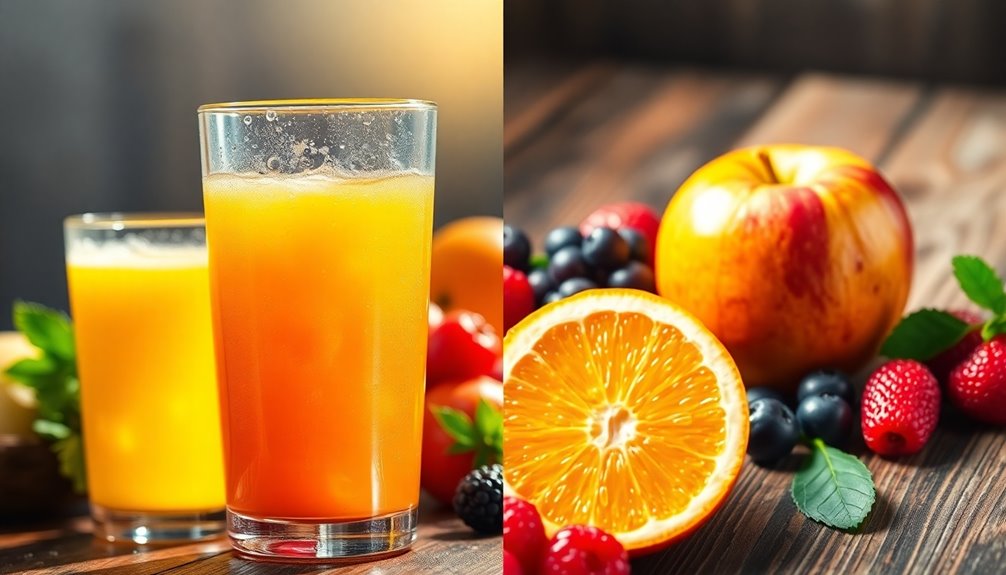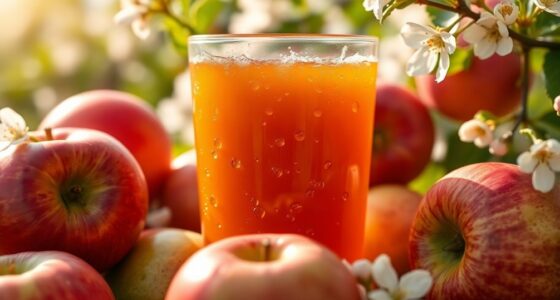When comparing juice and whole fruits, whole fruits come out on top. They're packed with fiber, which helps control blood sugar and keeps you feeling full longer. Juice might be easier to grab and drink on the go, but it often has higher sugar content without the fiber benefits. Plus, whole fruits are linked to lower risks of chronic diseases and better digestion. Curious about how these choices might affect your health? There's more to uncover!
Key Takeaways
- Whole fruits contain high fiber, promoting better digestion and blood sugar regulation compared to juice, which lacks this beneficial fiber.
- Juice often has high sugar content without the satiety of whole fruits, leading to increased calorie intake and potential weight gain.
- Regular consumption of whole fruits is linked to a lower risk of chronic diseases, such as heart disease and diabetes, unlike fruit juice.
- Whole fruits retain more vitamins and phytochemicals, enhancing overall nutrient intake, while juice processing can lead to nutrient loss.
- Whole fruits are convenient, cost-effective, and require no special equipment, making them a healthier on-the-go option compared to juice.
Nutritional Comparison: Fiber, Sugar, and Calories
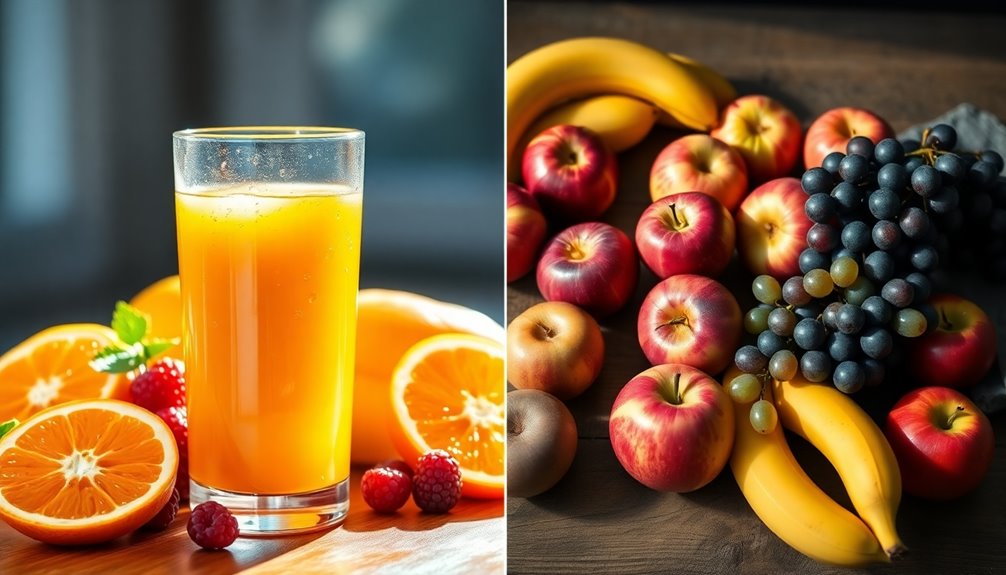
When you compare whole fruits to fruit juice, it's clear that their nutritional profiles differ significantly, particularly in fiber, sugar, and calories.
Whole fruits boast a rich fiber content, crucial for regulating blood sugar and aiding digestion. Most Americans consume only about 15 grams of fiber daily, and juicing strips away much of this fiber, leaving you with a sugar-laden liquid that's absorbed rapidly, potentially causing blood sugar spikes. Additionally, consuming whole fruits is associated with lower rates of depression in some studies.
A six-ounce serving of fruit juice can pack 15 to 30 grams of sugar, while whole fruits release sugar more slowly due to their fiber.
While fruit juice may have fewer calories—about 60 to 120 per serving—it lacks the satiety of whole fruits. Consequently, you might consume more calories overall when drinking juice instead of enjoying whole fruits.
Health Benefits of Whole Fruits vs. Juice
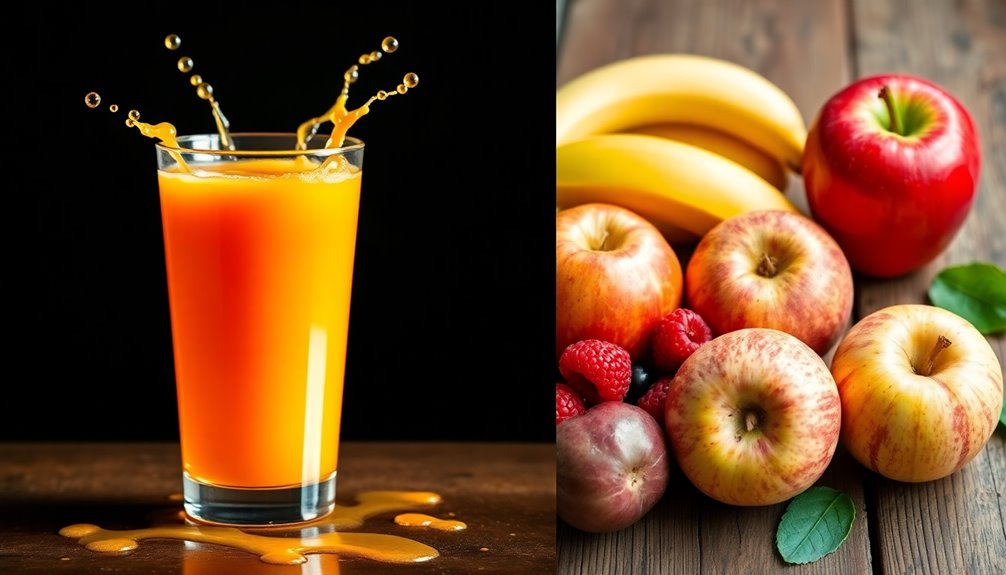
While both whole fruits and fruit juice can be part of a healthy diet, whole fruits offer distinct health benefits that juice simply can't match.
Eating whole fruits reduces your risk of chronic diseases like heart disease and diabetes, thanks to their fiber and nutrient content. Whole fruits help you feel fuller longer, which can lead to reduced calorie intake and support weight management. Additionally, whole fruits promote greater satiety, making them a more satisfying snack option. This is partly due to their high dietary fiber content, which aids digestion and promotes regularity.
They also regulate blood sugar levels better than juice, making them a smarter choice for those concerned about diabetes risk. Plus, whole fruits retain more vitamins and phytochemicals, enhancing your overall nutrient intake.
Digestive Health: The Role of Fiber
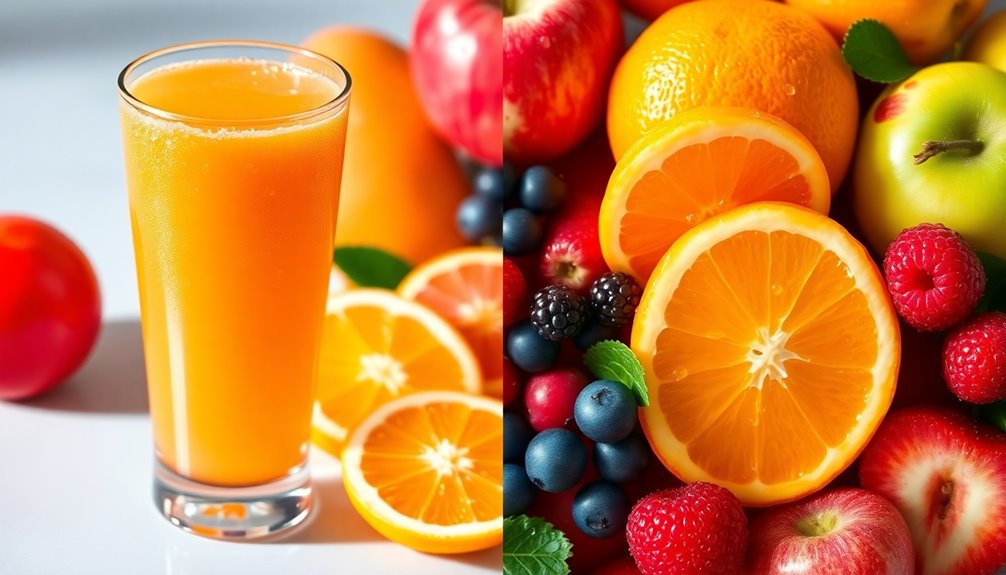
Fiber plays a crucial role in maintaining digestive health, making it essential for your overall well-being. There are two main types of fiber: soluble and insoluble.
Soluble fiber slows digestion, enhancing nutrient absorption, while insoluble fiber adds bulk to stool, preventing constipation and promoting regular bowel movements. Adequate fiber intake is important because insufficient fiber can lead to various digestive issues, emphasizing the need for proper consumption. Additionally, consuming whole fruits instead of juices can provide high fiber content, which is beneficial for digestion.
By including adequate fiber in your diet, you can support beneficial gut bacteria, which play a vital role in gut health. These bacteria produce short-chain fatty acids that reduce inflammation and strengthen your gut barrier.
Most adults fall short of their daily fiber needs, leading to digestive issues. Prioritizing whole fruits over juice can help you meet your fiber requirements, ensuring your digestive system functions smoothly and efficiently.
Convenience and Accessibility of Juice and Whole Fruits
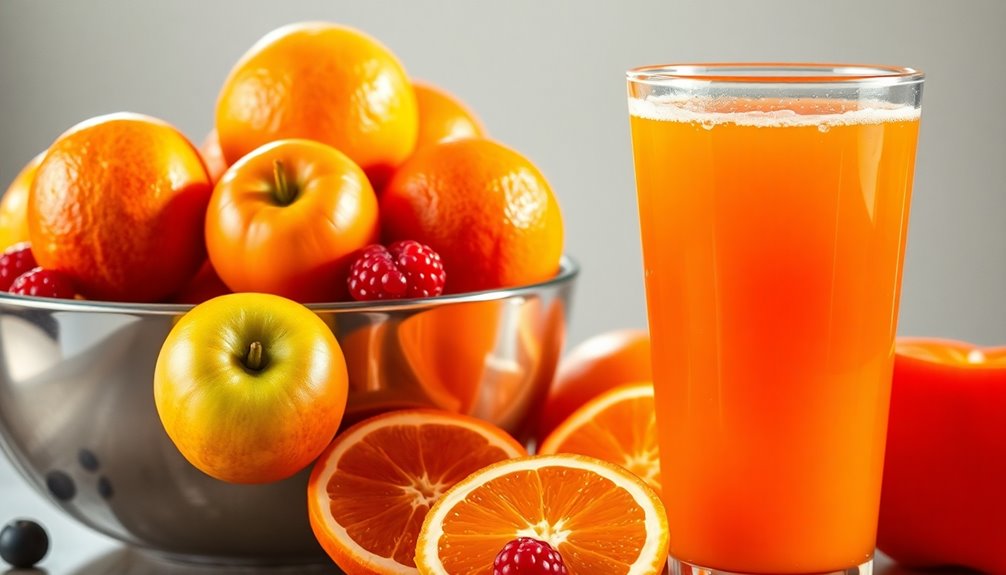
As you navigate your busy day, the convenience and accessibility of juice and whole fruits can significantly impact your dietary choices.
Juice offers portability and ease, making it simple to drink on-the-go. It's perfect for those who may struggle with chewing, and it saves time, especially with its long shelf life. You'll find a variety of juices in stores, often marketed as healthy alternatives, making them easily accessible. However, it's important to note that juicing extracts antioxidants and vitamins, but may reduce whole fruit benefits. Additionally, beet juice can enhance exercise performance, making it a great option for those on the go.
On the other hand, whole fruits come with their own advantages. They're naturally packaged, easy to grab, and cost-effective. With options available year-round, including frozen fruits and local farmers' markets, you can enjoy fresh snacks without special equipment.
Ultimately, both options provide unique benefits to fit your lifestyle.
Epigenetic Effects: How Fruits Influence Our Genes
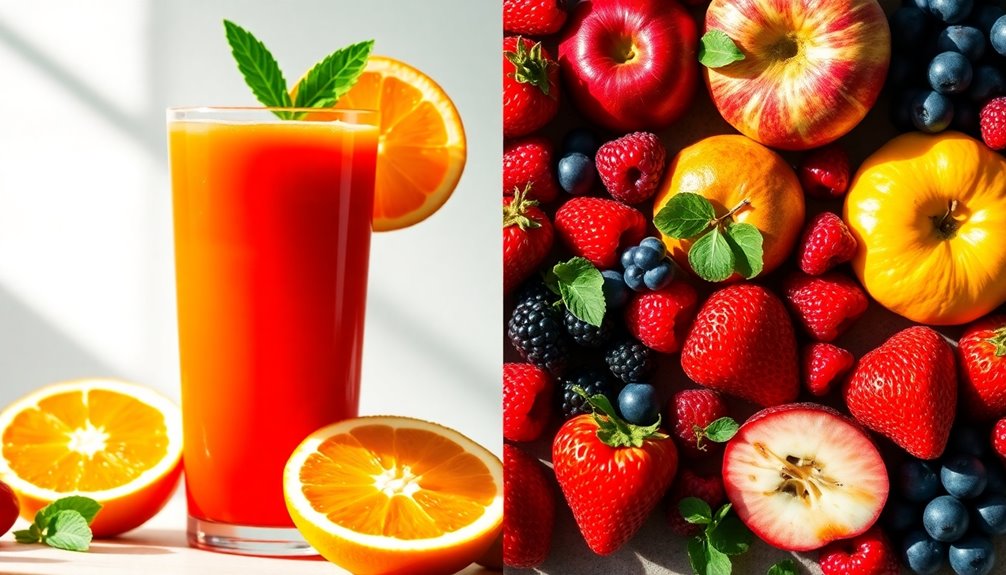
Understanding the epigenetic effects of fruits on our genes reveals how what you eat can influence your health at a molecular level. Whole fruits, rich in fiber, positively impact your epigenetic signatures, promoting better immune function and maintaining chromosome integrity. The fiber helps regulate nutrient absorption, shaping gene expression favorably. In contrast, fruit juices lack fiber, resulting in rapid sugar absorption and potentially pro-inflammatory epigenetic changes. This difference means your dietary choices directly affect gene regulation. Research indicates that whole fruit consumption confers distinct health benefits compared to fruit juice.
Overall Health Impact: Chronic Disease Prevention and Nutritional Balance
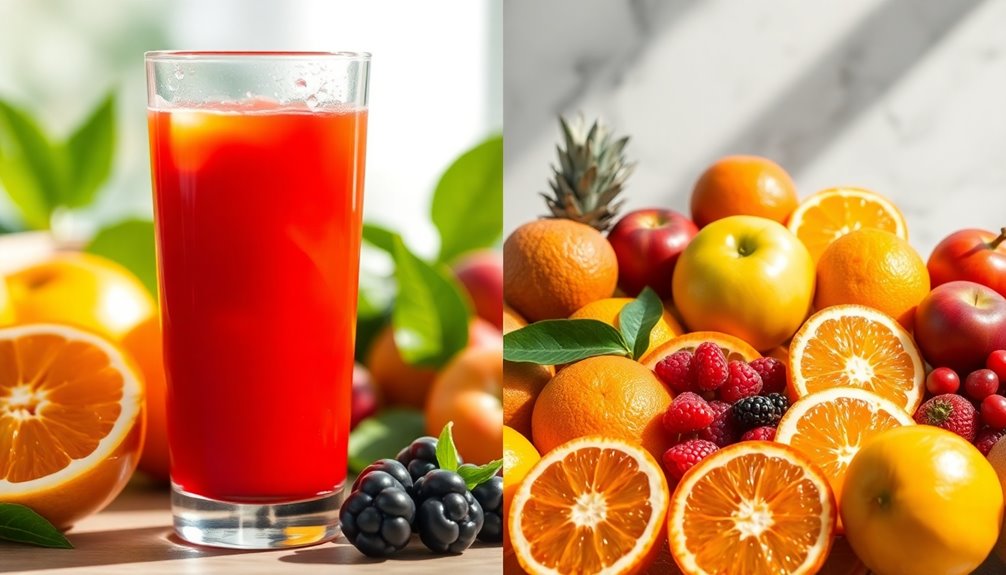
Choosing whole fruits over fruit juices can significantly impact your overall health by reducing the risk of chronic diseases and promoting nutritional balance. Whole fruits are not only packed with essential vitamins and minerals, but they also contain dietary fiber, which aids in digestion and helps maintain a healthy weight. In a juice versus whole fruits comparison, it becomes clear that whole fruits offer a more comprehensive nutritional profile, as they retain their natural sugars and nutrient content without the excess calories often found in juices. By opting for whole fruits, you can also experience greater satiety, which can help curb unhealthy snacking throughout the day.
Whole fruits pack more fiber, which slows sugar absorption, helping regulate blood sugar levels and lowering the risk of conditions like diabetes. They also retain vital nutrients, including phytochemicals and vitamins, that juices often lose during processing. In fact, daily fruit juice consumption has been linked to an increased diabetes risk, highlighting the importance of whole fruits. Regular consumption of whole fruits can also enhance self-care practices by improving dietary habits and overall wellness.
By filling you up, whole fruits support weight management, making it easier to avoid overeating. Additionally, the balanced mix of macronutrients in whole fruits aids digestion and nutrient absorption.
Prioritizing whole fruits not only nourishes your body but also plays a key role in preventing heart disease and other chronic conditions.
Frequently Asked Questions
Can Fruit Juice Be Part of a Balanced Diet?
Yes, fruit juice can be part of a balanced diet if you consume it in moderation. It provides essential vitamins and minerals, making it a convenient option for increasing your fruit intake.
However, you shouldn't rely solely on juice, as it lacks the fiber found in whole fruits.
Try to pair juice with meals and ensure you’re including whole fruits in your diet to maximize health benefits and maintain balanced nutrition. Incorporating a variety of juices, including those made from vegetables, can enhance your intake of essential vitamins and minerals. The benefits of vegetable juice are particularly noteworthy, as they can provide a concentrated source of nutrients while also promoting hydration. Additionally, experimenting with different flavors can make healthy eating more enjoyable and diverse, encouraging you to stick with nutritious choices in the long run.
How Much Fruit Juice Is Considered Safe to Consume Daily?
You shouldn't consume more than 8 oz of fruit juice daily if you're an adult.
For children, the limits vary: 4 oz for those aged 1-3 years, 4-6 oz for ages 4-6, and up to 8 oz for kids 7 and older.
Keeping these limits in mind helps you avoid excessive sugar intake, reducing the risk of obesity and other health issues.
Are There Any Added Nutrients in Commercial Fruit Juices?
Yes, there are added nutrients in commercial fruit juices.
You'll often find added sucrose, preservatives, and artificial flavorings to enhance taste and shelf life. Some juices even have extra vitamins and minerals to boost nutritional value.
However, the concentration process can increase sugar content and reduce fiber, which is vital for your digestion.
What Are the Environmental Impacts of Juice Production Versus Whole Fruit?
Imagine a world where every sip of juice you take adds to a mountain of plastic waste.
Juice production significantly impacts the environment, from greenhouse gas emissions during cultivation to excessive packaging waste.
In contrast, whole fruits leave a lighter footprint, needing less processing and creating minimal waste.
How Does Fruit Juice Affect Dental Health Compared to Whole Fruits?
Fruit juice can harm your dental health more than whole fruits. Its high acidity and concentrated sugars can lead to enamel erosion and cavities, especially since juice settles in hard-to-reach areas.
Whole fruits, while still acidic, have fiber that reduces sugar impact and promotes better oral health.
To protect your teeth, consider rinsing your mouth with water after consuming juice and opting for whole fruits whenever possible to minimize risks.
Conclusion
So, you thought sipping juice was a healthy shortcut, huh? While it might seem like the easier option, whole fruits pack a nutritional punch that juice simply can't match. With their fiber, lower sugar content, and more health benefits, whole fruits prove to be the real champions in the nutritional ring. Ironically, the quick fix of juice might just leave you craving the very goodness you could've gotten from biting into a fresh piece of fruit!
Cindy thoroughly researches juicing trends, techniques, and recipes to provide readers with practical advice and inspiration. Her writing style is accessible, engaging, and designed to make complex concepts easy to understand. Cindy’s dedication to promoting the advantages of juicing shines through her work, empowering readers to make positive changes in their lives through the simple act of juicing.

